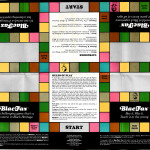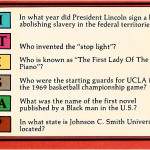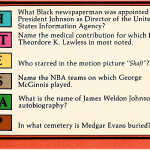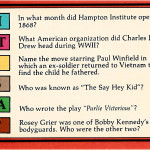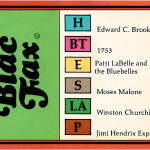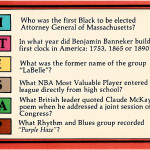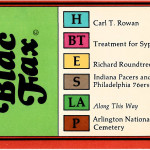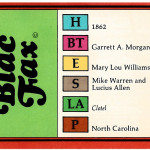Researching BlacFax and the Importance of Black history Board Games
By Dionna Gant
As part of the Dean’s Undergraduate Research Award (DURA) program, I worked during the summer of 2022 to research, draft, and finalize an independent essay for Memory We Hold in Our Hands, a book that will focus on black history-related artifacts and archival materials from Maryland. I chose to focus on BlacFax: At Last! 3,000 Questions on Black Culture for your Trivia Game, a 1985 Trivial Pursuit-style board game that focuses on black culture and history.
Before beginning my essay, I spent many hours working in Special Collections documenting Johns Hopkins’ collection of black board games. I also read many black children’s books from 1849 to present day. After becoming familiar with the collections, I set my focus on BlacFax and began my background research. I used databases like JSTOR, ERIC, and Sheridan Libraries’ Catalyst to find sources on topics like the educational attainment gap, changing educational theory during the 1960s and ‘70s, and the history of board games. While I did not directly use all of the sources I compiled, many of them were useful in brainstorming ideas for further research and getting a better understanding of the background literature.
With the research completed, I drafted a 1,000-word essay to be included in Memory We Hold in Our Hands. I worked alongside Gabrielle Dean, Johns Hopkins’ William Kurrelmeyer Curator of Rare Books and Manuscripts, to edit and revise my essay before we arrived at the final version. My essay uses BlacFax to explore the genre of black board games, many of which were published by small companies, and then explain a few reasons they were created.
I first explored the change in educational theory of the 1960s and ‘70s, which promoted the use of fun activities like board games to supplement traditional learning. I explain how these educational games excluded black history in blatant ways, and were very clearly not made with black players in mind. Additionally, although black history began being taught in schools in the 1970s, important issues like slavery, the Civil War, and Reconstruction were often overlooked. Again, black board games were a way to counteract this, as they included important facts about black history that many school systems ignored. Finally, I discuss these games as a way of increasing positive black representation for black children. I finished by tying the need for black board games into today, when black history education in schools is still under attack.
Prior to engaging in this project, I wasn’t aware of the existence of black board games. However, I am very grateful for the ability to work so closely with these games, as they are an interesting part of black history that many others probably don’t know about either. They demonstrate black people’s ingenuity and dedication to ensuring black history is known. I found it inspiring to see the ways that black people have stepped up and created the change they want to see. It was also very interesting to investigate the racist and exclusionary practices that made these games necessary in the first place.
This also speaks to why the entire project surrounding Memory We Hold in Our Hands is important. There is much more black history, like these black board games, that the average person is unaware of. This book will help shine light on black artifacts and archival materials from the Maryland area to ensure they get the attention they deserve. The book will contain essays from various historians, community activists, archivists, curators, and similar such persons in and around Baltimore, and is a great way to learn more about Maryland’s unique, and often overlooked, black history.
I would like to personally thank Gabrielle Dean and Tonika Berkley for their guidance and mentorship while working on this project. It would not have been possible without them.

